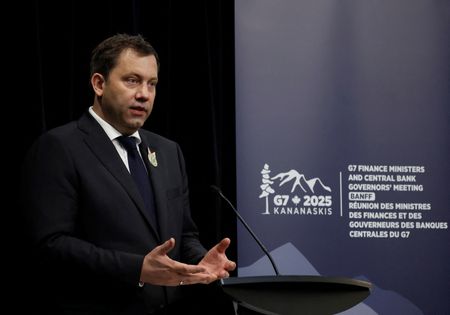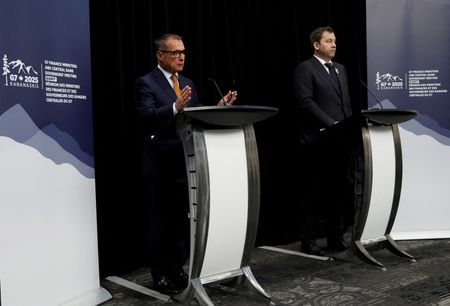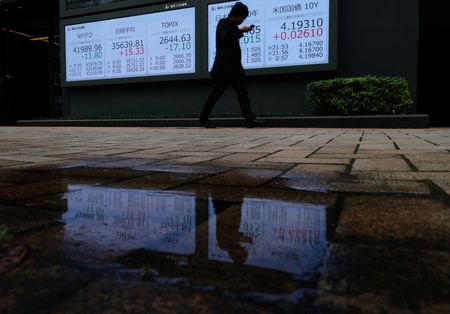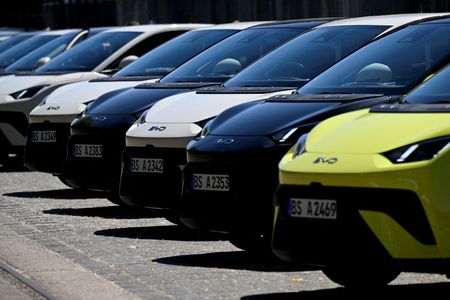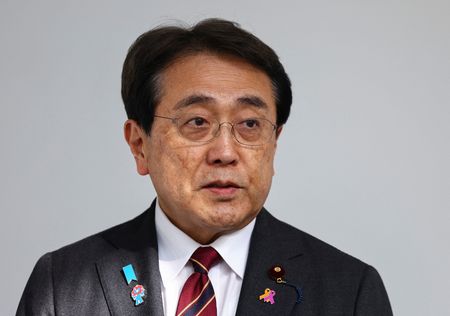By David Lawder and Promit Mukherjee
BANFF, Alberta (Reuters) – Finance ministers and central bank governors from the Group of Seven democracies pledged on Thursday to address “excessive imbalances” in the global economy and discussed lowering the G7 price cap on Russian crude oil exports to $50 per barrel, according to a draft communique and the European Commission.
The finance ministers and central bank governors, meeting in the Canadian Rocky Mountains, said there was a need for a common understanding of how “non-market policies and practices” undermine international economic security, according to parts of a communique seen by Reuters.
The draft statement calls for an analysis of “market concentration and international supply chain resilience.”
European Commission Executive Vice President Valdis Dombrovskis said the G7 ministers discussed proposals for further sanctions on Russia to try to end its war in Ukraine. They included lowering the G7-led $60-per-barrel price cap on Russian oil, given that Russian crude is now selling under that level, he said.
“Well, $50 is, you know, an indication. That’s something we believe could be a reasonable price cap within the context of current oil prices,” Dombrovskis said, adding that other energy sanctions were also discussed.
Brent crude currently trades around $64 per barrel.
A European official said the United States is “not convinced” about lowering the Russian oil price cap. A U.S. Treasury official did not immediately respond to a request for comment.
German Finance Minister Lars Klingbeil told reporters that a joint statement from G7 finance ministers and central bank governors meeting in Banff, Alberta, was still under negotiation but that he was optimistic there would be agreement.
The leaders agreed “on the importance of a level playing field and taking a broadly coordinated approach to address the harm caused by those who do not abide by the same rules and lack transparency,” the draft said.
Bloomberg News was first to report the draft communique.
The draft excerpts did not name China, but references by the U.S. and other G7 economies to “non-market policies and practices” often are targeted at China’s state subsidies and export-driven economic model.
The U.S. Treasury said earlier this week that Treasury Secretary Scott Bessent intended to press G7 allies to focus on rebalancing the global economy to protect workers and companies from China’s “unfair practices.”
The Chinese embassy in Ottawa said it could not immediately comment.
The draft also recognized an increase in low-value international “de minimis” package shipments that can overwhelm customs and tax collection systems and be used for smuggling drugs and other illicit goods.
The duty-free de minimis exemption for packages valued below $800 has been exploited by Chinese e-commerce companies including Shein and Temu.
Klingbeil said Russia needs to commit to serious peace talks to end the war in Ukraine, or face stronger international sanctions.
Finance leaders from G7 countries — the U.S., Britain, Canada, France, Germany, Italy and Japan — are meeting through Thursday. The excerpts may be part of a final communique being prepared to summarize three days of meetings.
(Reporting by David Lawder, Promit Mukherjee and Makiko Yamazaki in Banff and Anusha Shah in Bengaluru; Editing by Rod Nickel and Andrea Ricci)

